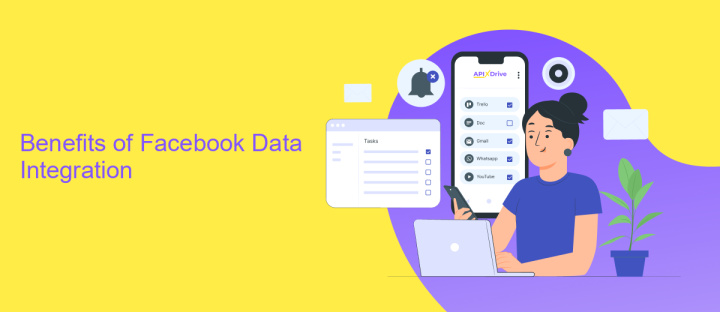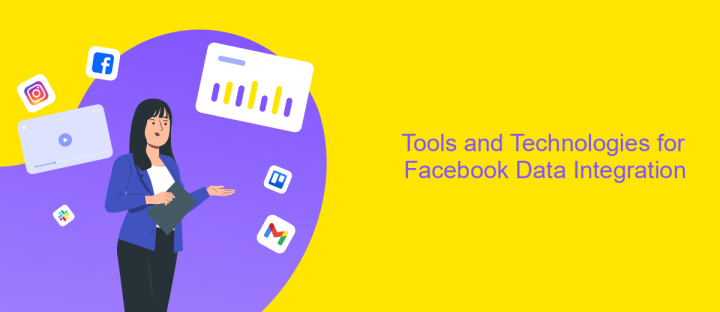Facebook Data Integration
Integrating Facebook data into your business operations can unlock a wealth of opportunities for targeted marketing, customer insights, and enhanced decision-making. By leveraging Facebook's vast user data, businesses can gain a deeper understanding of their audience, optimize ad campaigns, and drive growth. This article explores the key benefits and strategies for effective Facebook data integration, helping you harness its full potential.
Introduction
In today's digital age, integrating data from various social media platforms has become a crucial aspect for businesses aiming to leverage comprehensive analytics and insights. Facebook, being one of the leading social networks, offers a wealth of data that can significantly enhance marketing strategies, customer engagement, and overall business performance. Understanding how to effectively integrate Facebook data is essential for maximizing the potential of this vast information reservoir.
- Enhanced customer insights and segmentation
- Improved ad targeting and campaign performance
- Streamlined data management and reporting
- Real-time analytics and trend monitoring
By harnessing the power of Facebook data integration, businesses can gain a competitive edge in their respective markets. This process not only facilitates better decision-making but also enables more personalized and effective communication with customers. As we delve deeper into the methods and benefits of Facebook data integration, it becomes evident that this is an indispensable tool for modern enterprises.
Benefits of Facebook Data Integration

Integrating Facebook data into your business systems offers a multitude of benefits, enhancing both marketing and operational efficiencies. Through seamless data integration, businesses can gain real-time insights into customer behavior, preferences, and trends. This enables more targeted advertising strategies and personalized customer interactions, ultimately driving higher engagement and conversion rates. With Facebook data, companies can also optimize their content strategies by analyzing what types of posts generate the most interest and engagement.
Moreover, using services like ApiX-Drive simplifies the process of integrating Facebook data with various platforms such as CRM systems, email marketing tools, and analytics software. ApiX-Drive provides an intuitive interface and powerful automation capabilities, allowing businesses to effortlessly sync and manage data across multiple channels. This not only saves time but also reduces the risk of data discrepancies and errors. By leveraging these integrations, companies can maintain a cohesive and up-to-date view of their customer data, leading to more informed decision-making and improved business outcomes.
Challenges of Facebook Data Integration

Integrating Facebook data into business systems poses several challenges that can complicate the process and affect data quality and usability. These challenges are crucial to address for seamless data integration and to ensure that the data serves its intended purpose effectively.
- Data Privacy and Compliance: Adhering to data protection regulations such as GDPR and CCPA can be complex and requires careful handling of user data.
- API Limitations: Facebook's API has rate limits and access restrictions that can hinder the retrieval of large volumes of data.
- Data Consistency: Ensuring data consistency and accuracy when synchronizing between Facebook and other systems can be challenging due to differences in data structures.
- Security Concerns: Safeguarding sensitive data against breaches and unauthorized access is a significant concern.
- Technical Complexity: The integration process may require advanced technical skills and knowledge of Facebook's API and data formats.
Despite these challenges, businesses can leverage Facebook data integration to gain valuable insights, provided they implement robust strategies to mitigate these issues. Proper planning, compliance with regulations, and employing skilled professionals can help in overcoming these obstacles effectively.
Tools and Technologies for Facebook Data Integration

Integrating Facebook data into your systems requires a combination of specialized tools and technologies. These tools help streamline the process, ensuring data is accurately collected, processed, and analyzed. The right set of tools can significantly enhance the efficiency and effectiveness of your data integration efforts.
One of the primary tools for Facebook data integration is the Facebook Graph API. This powerful API allows developers to access a wide range of data from Facebook, including user profiles, posts, comments, and more. Additionally, data extraction tools and ETL (Extract, Transform, Load) platforms play a crucial role in managing and processing the data.
- Facebook Graph API
- ETL Platforms (e.g., Talend, Apache Nifi)
- Data Warehousing Solutions (e.g., Amazon Redshift, Google BigQuery)
- Data Visualization Tools (e.g., Tableau, Power BI)
These tools, when used in conjunction, provide a comprehensive solution for Facebook data integration. By leveraging these technologies, organizations can gain valuable insights from their Facebook data, enabling better decision-making and improved business outcomes.
- Automate the work of an online store or landing
- Empower through integration
- Don't spend money on programmers and integrators
- Save time by automating routine tasks
Best Practices for Facebook Data Integration
When integrating Facebook data, it is essential to ensure data accuracy and consistency. Start by clearly defining your data requirements and objectives. Use Facebook's Graph API to access the data, and consider leveraging third-party services like ApiX-Drive to streamline the process. ApiX-Drive can automate data extraction and synchronization, reducing manual effort and minimizing errors. Regularly monitor and validate the data to maintain its integrity and address any discrepancies immediately.
Security is another critical aspect of Facebook data integration. Protect sensitive information by implementing robust authentication and encryption protocols. Ensure compliance with Facebook's data usage policies and privacy regulations. Limit access to the data based on user roles and responsibilities to prevent unauthorized access. Additionally, keep your integration tools and software up-to-date to safeguard against potential vulnerabilities. By following these best practices, you can optimize your Facebook data integration process and derive valuable insights with confidence.
FAQ
What is Facebook Data Integration?
Why should I integrate Facebook data with other systems?
What types of data can be integrated from Facebook?
How can I automate the integration of Facebook data?
Is it secure to integrate Facebook data with other systems?
Strive to take your business to the next level, achieve your goals faster and more efficiently? Apix-Drive is your reliable assistant for these tasks. An online service and application connector will help you automate key business processes and get rid of the routine. You and your employees will free up time for important core tasks. Try Apix-Drive features for free to see the effectiveness of the online connector for yourself.


